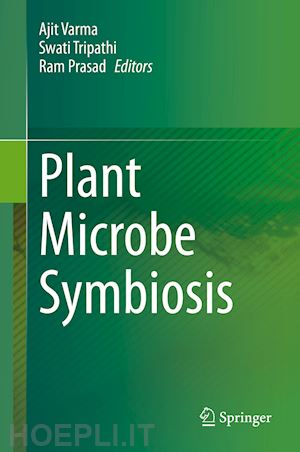
Questo prodotto usufruisce delle SPEDIZIONI GRATIS
selezionando l'opzione Corriere Veloce in fase di ordine.
Pagabile anche con Carta della cultura giovani e del merito, 18App Bonus Cultura e Carta del Docente
This book provides an overview of the latest advances concerning symbiotic relationships between plants and microbes, and their applications in plant productivity and agricultural sustainability.
Symbiosis is a living phenomenon including dynamic variations in the genome, metabolism and signaling network, and adopting a multidirectional perspective on their interactions is required when studying symbiotic organisms.
Although various plant-microbe symbiotic systems are covered in this book, it especially focuses on arbuscular mycorrhiza (AM) symbiosis and root nodule symbiosis, the two most prevalent systems. AM symbiosis involves the most extensive interaction between plants and microbes, in the context of phylogeny and ecology. As more than 90% of all known species of plants have the potential to form mycorrhizal associations, the productivity and species composition, as well as the diversity of natural ecosystems, are frequently dependent upon the presence and activity of mycorrhizas.
In turn, root nodule symbiosis includes morphogenesis and is formed by communication between plants and nitrogen-fixing bacteria. The biotechnological application of plant–microbe symbiosis is expected to foster the production of agricultural and horticultural products while maintaining ecologically and economically sustainable production systems.
Designed as a hands-on guide, this book offers an essential resource for researchers and students in the areas of agri-biotechnology, soil biology and fungal biology.
The Rhizobium–Plant Symbiosis: State of the Art.- Diversity and Importance of the Relationship Between Arbuscular Mycorrhizal Fungi and Nitrogen-Fixing Bacteria in Tropical Agroforestry Systems in Mexico.- Nitrogen Fixation in a Legume-Rhizobium Symbiosis: The Roots of a Success Story.- A Genome-Wide Investigation on Symbiotic Nitrogen-Fixing Bacteria in Leguminous Plants.- Symbiotic Signaling: Insights from Arbuscular Mycorrhizal Symbiosis.- Contribution of Beneficial Fungi for Maintaining Sustainable Plant Growth and Soil Fertility.- Biofertilizers Toward Sustainable Agricultural Development.- Plant Microbiome: Trends and Prospects for Sustainable Agriculture.- Plants and Microbes: Bioresources for Sustainable Development and Biocontrol.- Plant-Microbiome Interactions in Hydrocarbon-Contaminated Soils.- Rhizoremediation: A Unique Plant Microbiome Association of Biodegradation.- Pesticide Tolerant Rhizobacteria: Paradigm of Disease Management and Plant Growth Promotion.- Structure and Function of Rhizobiome.- Soil Microbes-Medicinal Plants Interactions: Ecological Diversity and Future Prospect.- Insight to Biotechnological Advances in the Study of Beneficial Plant-Microbe Interaction with Special Reference to Agrobacterium tumefaciens.- Amelioration of Salt Stress Tolerance in Plants by Plant Growth-Promoting Rhizobacteria: Insights from “Omics” Approaches.- Plant Microbial Ecology as a Potential Option for Stress Management in Plants.
Dr Swati Tripathi: Assistant Professor at Amity Institute of Microbial Technology, Amity University, Noida, India. She is working on plant microbe interaction, and microbial biotechnology. Dr Tripathi has a number of research papers and review articles to her credit in the journals of international repute. She has her post doctoral experience from South Korea and has been awarded Early Career Research Award recently.
Dr Ram Prasad: Assistant Professor at Amity Institute of Microbial Technology, Amity University, Noida, India. He is working on plant microbe interaction, nanobiotechnology, and microbial biotechnology. Dr Prasad has edited several books and has a number of research papers and review articles to his credit in the journals of international repute. During 2014, Dr Prasad has been awarded American Cancer Society UICC International Fellowship for Beginning Investigator, USA. Presently, he is working as Research Associate Professor at School of Environmental Sciences and Engineering, Sun Yat-Sen University, China.











Il sito utilizza cookie ed altri strumenti di tracciamento che raccolgono informazioni dal dispositivo dell’utente. Oltre ai cookie tecnici ed analitici aggregati, strettamente necessari per il funzionamento di questo sito web, previo consenso dell’utente possono essere installati cookie di profilazione e marketing e cookie dei social media. Cliccando su “Accetto tutti i cookie” saranno attivate tutte le categorie di cookie. Per accettare solo deterninate categorie di cookie, cliccare invece su “Impostazioni cookie”. Chiudendo il banner o continuando a navigare saranno installati solo cookie tecnici. Per maggiori dettagli, consultare la Cookie Policy.